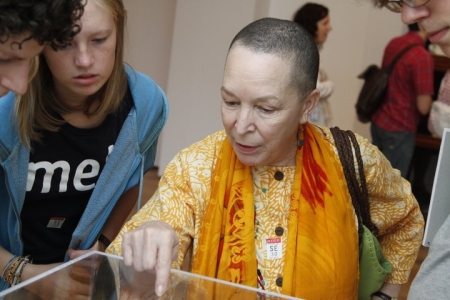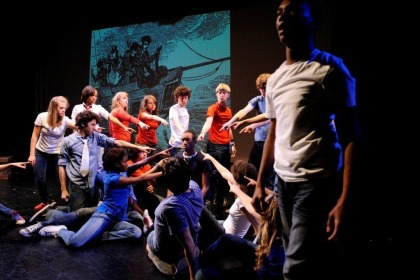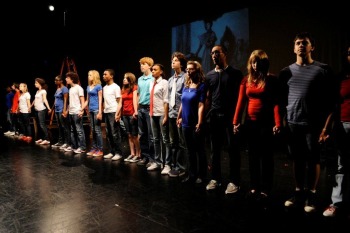A Most Creative Collision: Playwright Pearl Cleage riffs on her encounter with 21 teens during the Alliance Theatre’s ‘Collision Project’
For the past 10 years, the Alliance Theater in Atlanta, Georgia has chosen 20–24 teens to participate in a summer high school playwriting program envisioned by Artistic Director Susan V. Booth and entitled 'The Collision Project." 
The young people extract what is interesting and meaningful within the classic text and create their own play in response to the original work.
The source text may be a play, a novel, a poem, a speech or any other written word that is considered “classic”.
Rosemary Newcott, the Sally G.Tomlinson Artistic Director of Theatre for Youth and Families and production manager, Rodney Lamar Williams have guided them through the process. Each year a different playwright is in residence to assist in the formation of the script and to ask questions that offer insights specific to their view of the text. The result is a magical collision of ideas. 2011 Collision Project playwright Pearl Cleage writes most eloquently about her experience:
The most challenging thing about the Collision Project is trying to find a way to describe it that gives the interested outsider a glimpse of how unique and amazing and necessary and useful this project is on every level. It taps directly into the deep well of truth and curiosity and honesty and vulnerability and fierce determination to be heard that is found in young people around the world. Metro Atlanta teens are no different. I had no doubt the participants would be an interesting group of young people. That was not the problem. The problem was worrying. As a playwright with a fairly traditional way of developing scripts, I couldn’t get my mind around how I was going to write a script with input from 21 young people I’d never met, some of whom were writers, but most of whom were not. I couldn’t figure out how I could possibly get to know them well enough in two weeks to write anything for them that made sense. That was before I understood that I wasn’t going to be writing for them. I was going to be writing with them.

I also second guessed our decision to use The Declaration of Independence as our text. While I was excited by ideas of citizenship and national change in these strange and amazing times, and in spite of the fact that my post-Obama embracing of my American-ness was the major question I was exploring in my own work, I wasn’t sure what impact the document itself would have on people for whom history seems to have less and less relevance to their real lives. In the mist of all that worrying, I kept trying to get someone to define the playwrights role for me, but everybody just kept telling me it was something magical and wonderful and different every time. “We use the gifts in the room,” Rosemary e-mailed, which was not comforting to me. What if the gifts in the room were not complimentary to my own? Did I get veto power or was that against the whole spirit of the project?
This worrying is important because it is my firm belief that most writers are worriers. Especially playwrights. It is the natural outcome of spending long hours arguing all sides of every question in your own head in order to give each of the characters you’re creating a fair shake at winning the discussion, proving the premise and earning the love of audiences everywhere. The love of the audiences is important since there are usually actors involved and how old were these kids anyway?
Turns out, I didn’t need to worry. The advice Rodney gave at the beginning was right. It was one long, passionate improvisation on The Declaration of Independence that I can honestly say gave me great hope for the next generation. The young people I had the great pleasure to encounter in Collision X (the 10th version of the program) came from as close as Grady High School and as far away as Social Circle. They were a bright, outspoken mixture of all the qualities that make it easy to be a good teacher, and a good student. They had opinions, strong opinions, about almost everything, but they also had amazing compassion towards each other. They listened deeply to vastly different points of view without ever shutting off discussion or masking their real emotional reactions to sensitive topics. They were world class huggers.

They challenged my listening skills, especially at first when I wanted to correct them when their ideas didn’t reflect my own. When I wanted to assert my seniority, my status, my power and tell them how they should think about every little thing. When I wanted to make sure they understood the complexity of Thomas Jefferson and the humanity of Sally Hemmings. When I wanted to look at them as if their world was the same one I had inhabited at fifteen or sixteen or eighteen, which of course, it is not. They made me slow down and look at them individually, one by one, and each by each, until Alex wasn’t Andy and Max wasn’t Kevin and no way I would confuse Gina and Dina and Ameena or Teddy and Noah or the ones who were already searching for the truth with the ones who weren’t sure what they were searching for, but which didn’t mean they weren’t looking just as hard.
They made me laugh and they made me remember. They made me want to know what they had to say and want to listen harder to what they didn’t say. They allowed me to see them so clearly that I could put together a piece that sounded like them because it was their words, their thoughts, their emotions and confusions and yearnings that they had put on paper and handed to me, or e-mailed to me, and then hoped I would make them look good. I think we did better than that. We made them look like themselves. The script was a mirror of our three week journey together and a group photograph of who they were at this particular moment in their lives. We had encouraged them to consider their citizenship. They responded to the challenge by also considering their humanity.
I think what the Collision Project actually does through a rigorous three weeks of exercises, activities and discussions is encourage participants to have faith in themselves and in each other. I think they emerge energized, empowered and hopeful, as do those of us who are privileged to be their guides.
We know that one person can change the world and we teach young people this truth all the time. We ask them to consider “the power of one,” and to stand up for what they believe, even if they must stand alone. We point to people like Nelson Mandela or Martin Luther King, Jr., and we say that their commitment and their courage transformed the times in which they lived. We tell them they are that person, too. If we believe it, we must believe that transforming the lives of this small group of young people is a part of the process of changing the world into a more humane, more compassionate, more caring place.
Everyone who made this project happen contributed to the great experience we all had this summer, but I would be remiss if I didn’t mention the perfectly balanced partnership between Rosemary and Rodney that guided the whole process is such a loving way without ever expecting less than each participant’s best attention and intent. I thank you, all of you, for one of the best creative experiences of my life.
And to the playwrights who are fortunate enough to work with Collision in the future, I have these few words of advice, as Rodney said at the beginning: Just think of it like jazz.
Photo credit – Pearl at High Museum – Julie Marateck
Photo credit – Collision Production shots – Greg Mooney
